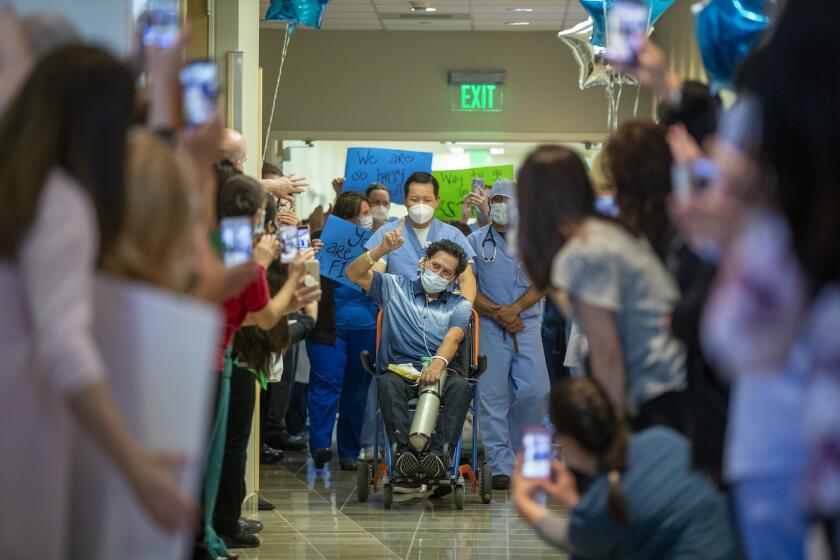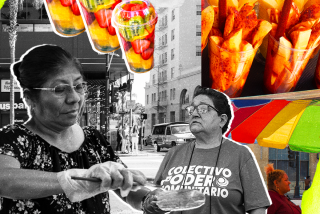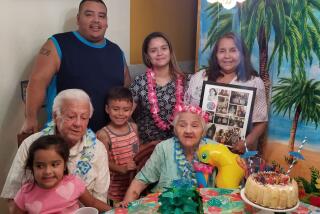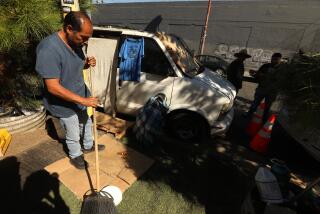She lost her job because of coronavirus. Now she and her son sell masks on a street corner
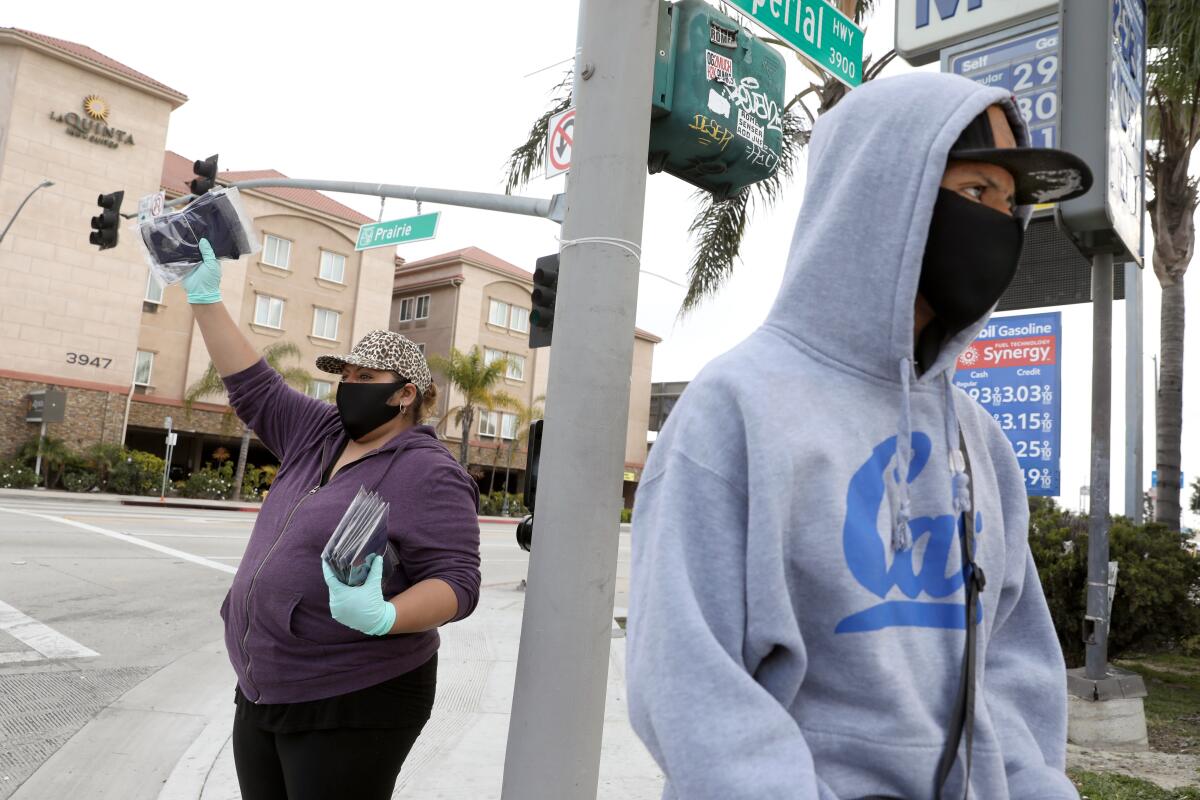
- Share via
Brenda Mendez stood at the busy street corner holding a small treasure in her teal-gloved hands, an offering to the oncoming traffic.
She was selling masks, each one wrapped in clear, crinkly plastic. But what she really offered on this grim, cloudy day was a sense of safety in a perilous world, a barrier against disease and disaster. All for $5.
“Allá, mijo,” Mendez said, directing her 15-year-old son to the blue pickup truck in the left lane of Prairie Avenue. A customer. “Con cuidado,” carefully, she warned as he weaved between cars waiting at the stoplight.
Within a minute, David was back, clutching $10 in his own gloved hands. Two sold, dozens more to go.
The mother and son — both novice street vendors — made an unusual team. Until the novel coronavirus shut down most California schools, the sophomore spent most of his week in a classroom. Until the restaurants closed, his mother toiled at a Redondo Beach mariscos restaurant.
But when the pandemic hit, Mendez found herself out of work with bills piling up, like more than a million other Californians.
“I couldn’t sleep,” she said. “The stress was killing me.”
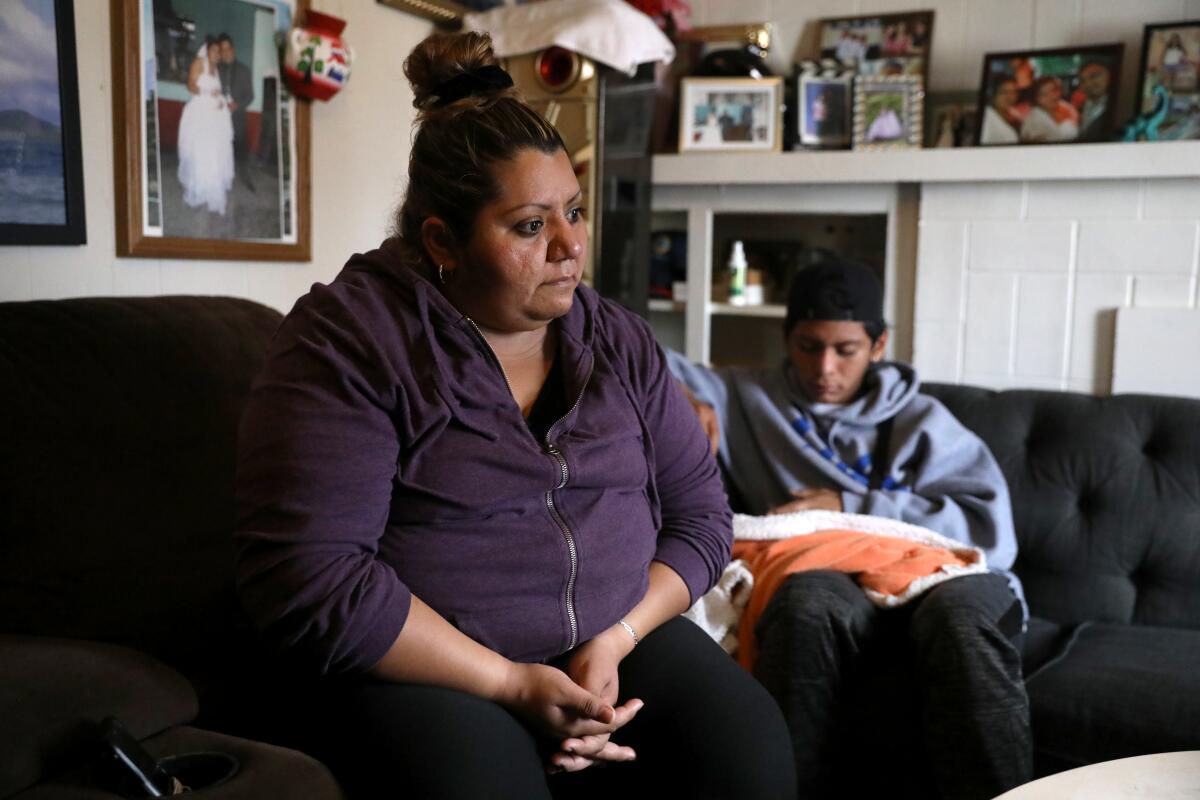
Mendez is no stranger to suffering. The scar from where she was shot on a bus in Guatemala still stretches across her stomach, a permanent reminder of the violence that forced her family to flee the country nearly two years ago.
Before Mendez and her family sought asylum in the U.S., the 33-year-old woman with melancholy eyes worked as a caregiver for older men and women who could not care for themselves. She dreamed of one day becoming a nurse.
She wanted to be the kind of woman who helps in times of crisis, who comforts, who heals. The kind of woman staffing hospitals and emergency rooms in 2020, on the front lines of the fight against a pandemic that has killed tens of thousands and harmed so many more. The kind of woman lauded as a hero, putting her own life on the line to help save others.
But.
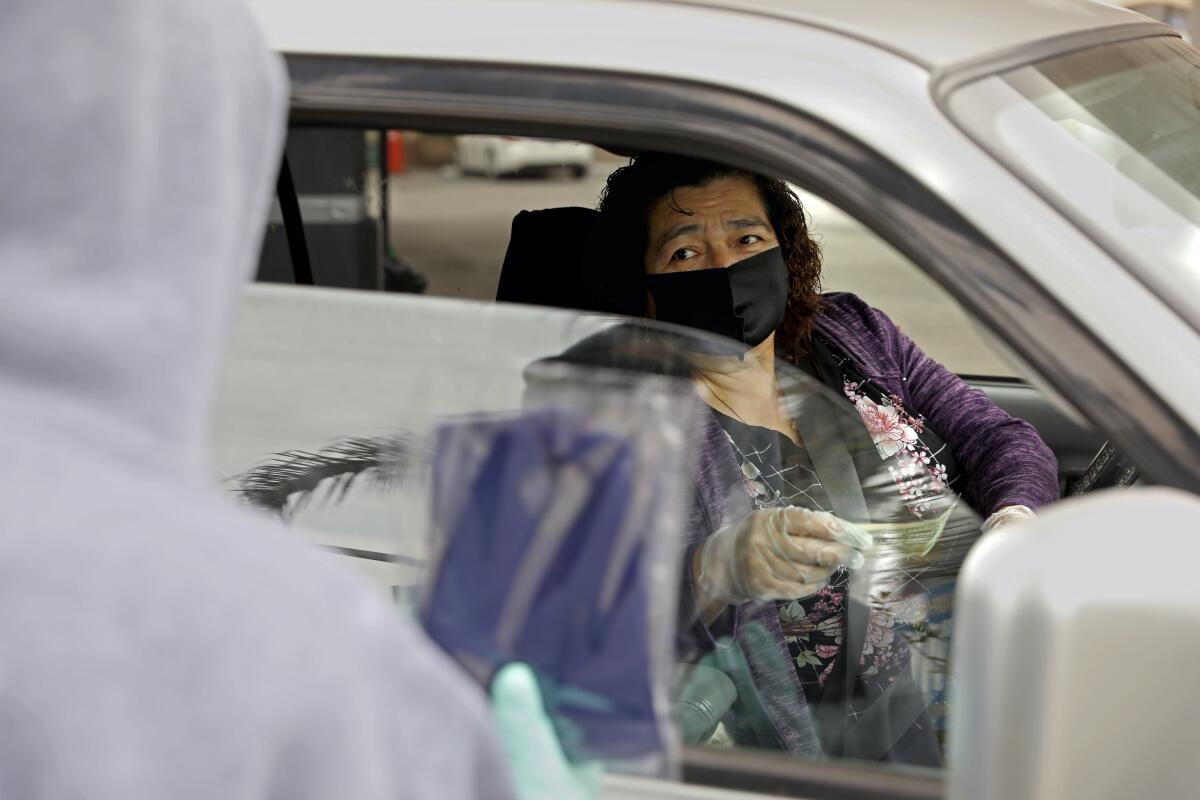
But like so many immigrants searching for safety and a new life, Mendez had left behind her home, her livelihood and her dreams.
When she arrived in the U.S., she took the first job she could find, in a restaurant kitchen where she made less than the minimum wage. Then, this year, came the virus and the restaurant’s temporary closure.
Her husband stopped getting calls for construction jobs. They live with Mendez’s mother in Redondo Beach, but she didn’t want to weigh the older woman down with more responsibility, more financial cares.
Her neighbor — a co-worker from the restaurant — made Mendez an offer she wished she could refuse: selling masks, sewn by the neighbor’s husband, on a street corner on the border of Hawthorne and Inglewood.
The thought, Mendez told her neighbor, filled her with shame.
“Me too,” the neighbor said. “But what else can we do?”
Now, instead of suiting up for nurse’s duty as she once dreamed, Mendez is a walking advertisement of goods for sale. She dons a mask each morning, adjusting the straps behind her ears, straightening the fabric across her cheekbones and chin.
U.S. Latinos are among the hardest hit by pay cuts and job losses due to the coronavirus that causes COVID-19, according to a Pew Research Center survey. Around 49% of Latinos said they or someone in their home had seen wages fall or a job disappear — or both — because of the outbreak, compared with 33% of all U.S. adults.
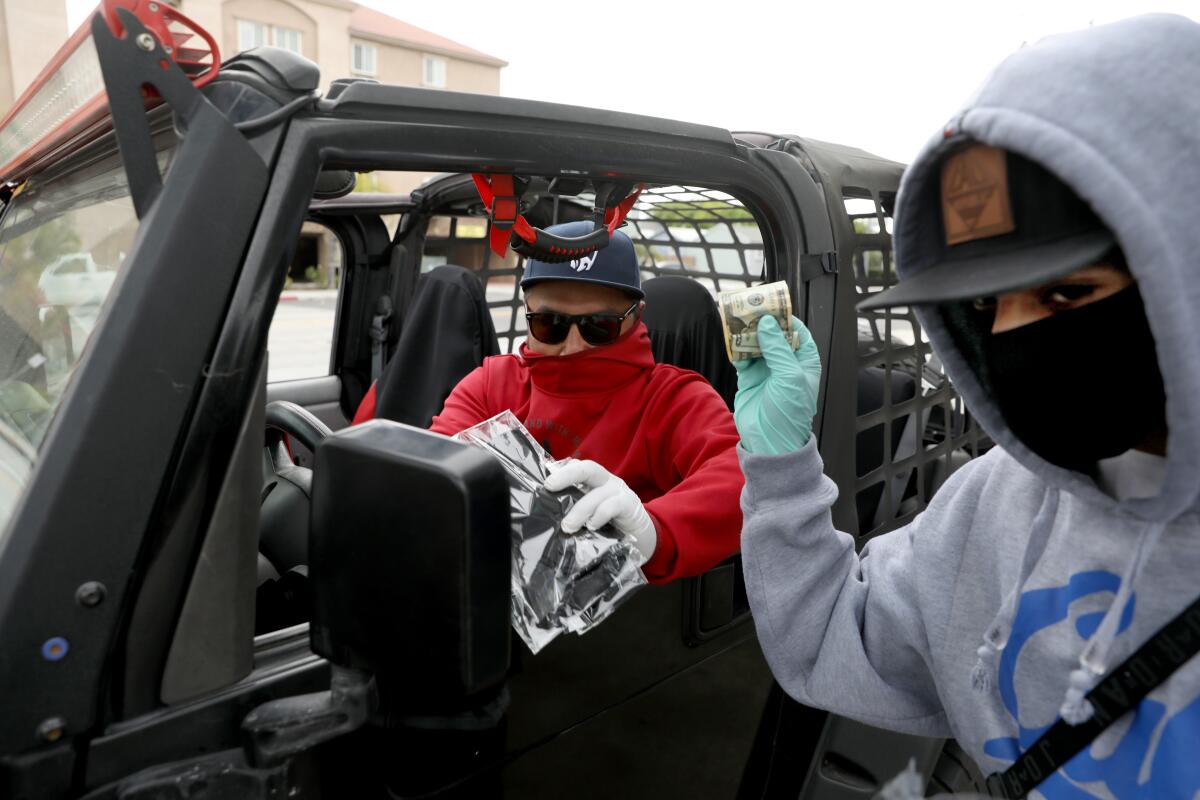
Mendez decided she had no other choice but to try her hand at street vending. David offered to help. His mom doesn’t speak English, and he didn’t want her to be alone.
Her neighbor’s husband charged her $30 for a dozen masks, less than what she would pay online. She bought several dozen.
Their first day, April 1, she and her son started out nervous. Mendez felt as if everyone was staring at her as she waved the blue and black cloth masks.
But by the time her husband picked them up — their faces burned from standing out in the sun — they had sold everything. That day they netted $150.
“We’re helping them protect themselves,” Mendez said, “and they’re helping us make money.”
These are some of the unusual new scenes across the Southland during the coronavirus outbreak.
On Saturday, under a cloudy sky, Mendez and David set up shop on the corner outside a Mobil gas station before 8 a.m. Mendez’s mother, who began selling the day before, found a spot across the street.
They had fewer masks than usual, Mendez’s supplier unable to sew as fast as his customers were selling.
A day earlier, the Centers for Disease Control and Prevention had advised Americans to wear a basic cloth or fabric mask when they went out to help curb the spread of the coronavirus. This week, Los Angeles Mayor Eric Garcetti announced an order requiring all residents to wear a face covering when visiting essential businesses.
For Mendez and David, the order and advisory meant greater demand, and they became well-practiced at gauging interest. They quickly spotted windows coming down at the intersection. Although Mendez doesn’t know English, she knew enough to throw up five fingers when drivers called out for the price.
When a hand beckoned, it was often David who hustled over in his red and white Nike shoes. He tucked the day’s earnings in a black crossbody bag.
He demonstrated how to put the mask on properly, pulling back his hoodie to show how the straps looped around his ears. Other times he listened as people tried to bargain or complained about the price.
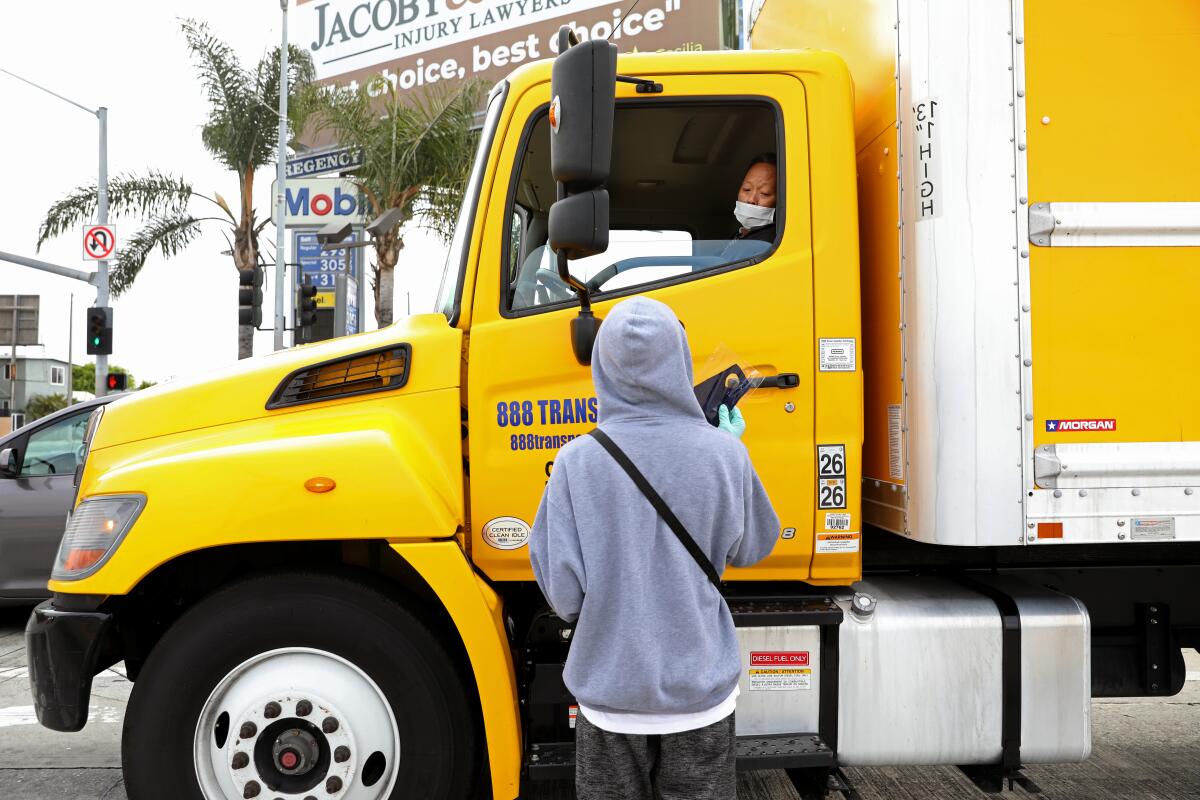
“Que dijo, David?” Mendez asked.
“Dice que es mucho five dollars. Cinco dólares,” David told his mom, switching back to Spanish as he explained that a customer said the masks cost too much.
At times, David took a break to text his friends. He hadn’t told any of them what he was doing, he said, feeling too embarrassed over it. But he loved his mom and wanted to help. Like her, he also dreamed of one day being a nurse.
Throughout the morning, they sold to truck drivers, UPS workers, landscapers and Uber drivers. Ron Hamilton, a security guard, bought one ahead of his graveyard shift in Hollywood.
He had spotted the two selling a couple of days earlier, but he didn’t have money at the time. The 50-year-old hadn’t been worried, but soon he spotted people wearing masks everywhere.
“I figured I better get on it,” he said. “I just don’t want to take any chances.”
One woman stopped to buy three masks, trying to protect her 80-year-old mom who had just had her thyroid removed and was being released from the hospital.
In a store, someone had tried to charge her $250 for one mask.
“Thank you for the good work!” a man called out from his car, holding up a thumbs-up at Mendez and David. Mendez nodded, not understanding.
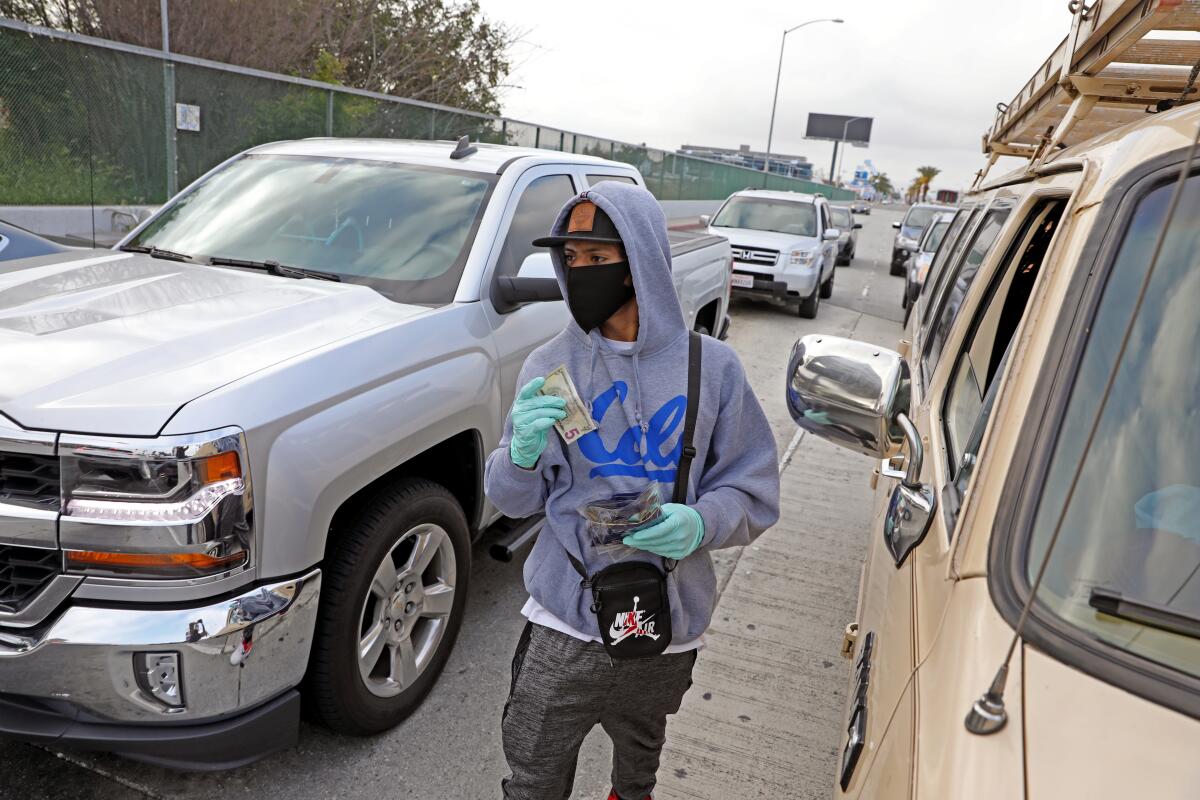
Mother and son shifted from foot to foot, trying to take the weight off as the minutes passed. Mendez was used to standing for hours in the restaurant kitchen making shrimp fajitas, but David had less practice.
“He gets tired on me,” she said, as David sat on a sewer lid with his feet on the asphalt.
By 10 a.m., their supply had dwindled — almost time to head home.
“Only two more, sell them fast,” David told his mom, breaking into a laugh that crinkled his eyes above the mask that obscured his face.
Mendez pulled down her own mask and wiped the sweat from her forehead. When she’s out there, she thinks of all the reasons they had come to the United States.
They fled a dangerous situation and now live in a country brimming with possibilities for her two sons.
“Pero cuesta,” she said, as she kept an eye on her son. But it costs.
Times staff photographer Gary Coronado contributed to this report.
More to Read
Sign up for Essential California
The most important California stories and recommendations in your inbox every morning.
You may occasionally receive promotional content from the Los Angeles Times.

